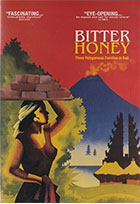
Bitter Honey 2015
Distributed by Documentary Educational Resources, 101 Morse Street, Watertown, MA 02472; 617-926-0491
Produced by Alessandra Pasquino
Directed by Robert Lemelson
DVD, color, 81 min., In Balinese and Indonesian, with English subtitles. Adult themes.
High School - General Adult
Anthropology, Children, Culture, Domestic Violence, Family Relations, Marriage, Polygamy, Spouse Abuse, Women’s Rights
Date Entered: 01/13/2017
Reviewed by Kathleen Spring, Nicholson Library, Linfield College, McMinnville, ORIndonesian law codifies an unequal power structure between men and women with regard to polygamous marriages. On the island of Bali, many people still believe that the more wives a man has, the more powerful he will be; indeed, some men believe they are destined to be polygamous. Approximately 10% of registered marriages in Bali are polygamous, although the real percentage may be higher since many polygamous marriages are not officially recorded. In Bitter Honey, anthropologist and filmmaker Robert Lemelson follows three polygamous families in an attempt to explore how social and cultural rules surrounding marriage impact women’s agency and contribute to gender inequality and domestic violence in Bali.
Women who have children out of wedlock in Bali are characterized as “sluts” or prostitutes and may be cast out of their families. These women and others (including widows and the mentally ill) who are living on the fringes of society are often willing to marry a polygamist in order to save the family (and their own) name. One interpretation of polygamy, then, is as a “heroic act” that “saves” women from worse fates.
Bitter Honey takes its title from the slang term (“honeys”) for second, or subsequent, wives. Although Lemelson filmed the documentary over the course of seven years, the passage of time is actually downplayed since the narrative is structured thematically rather than chronologically. Lemelson does an excellent job of letting the families tell their own stories, and he refrains from editorializing through voiceover or other mechanisms, instead trusting in the power of his interviewees’ words. Lemelson intercuts these interviews with footage from a shadow puppetry troupe performance on family life in Bali, as well as conversations with a local anthropologist and an attorney, to provide cultural context.
At times, the juxtaposition of the shadow puppetry segments and the interviews with polygamous family members feels too obvious, as though Lemelson is concerned his viewers won’t get the message from the interviews alone. Nonetheless, the overall editing is solid, the production quality of the film is good, and subtitles are well executed. Bonus features on the DVD include an interview with Lemelson, as well as short features on male perspectives of polygamy and gender-based violence prevention. Bitter Honey would be appropriate for undergraduate courses in anthropology, family studies, and gender/women’s studies.